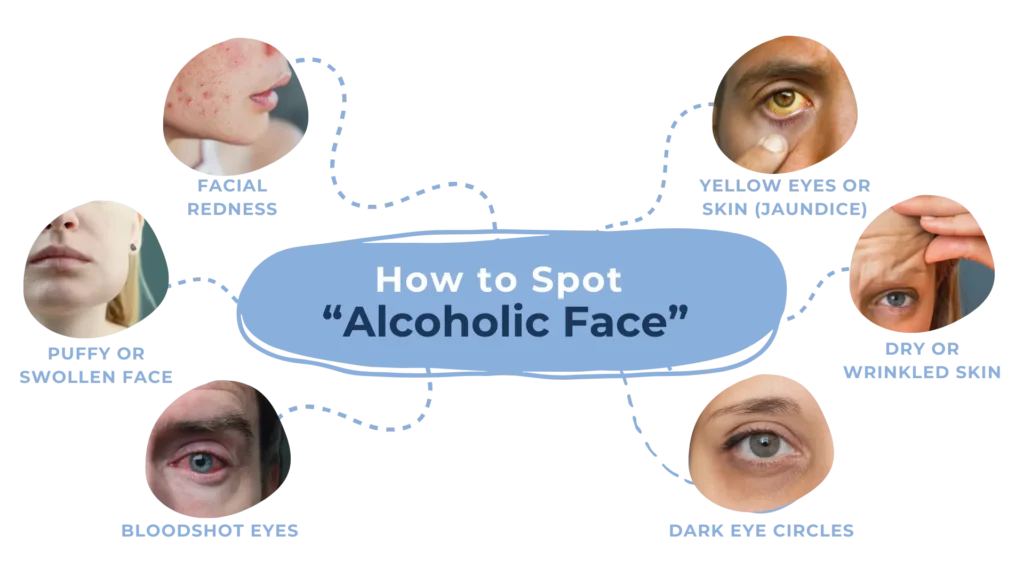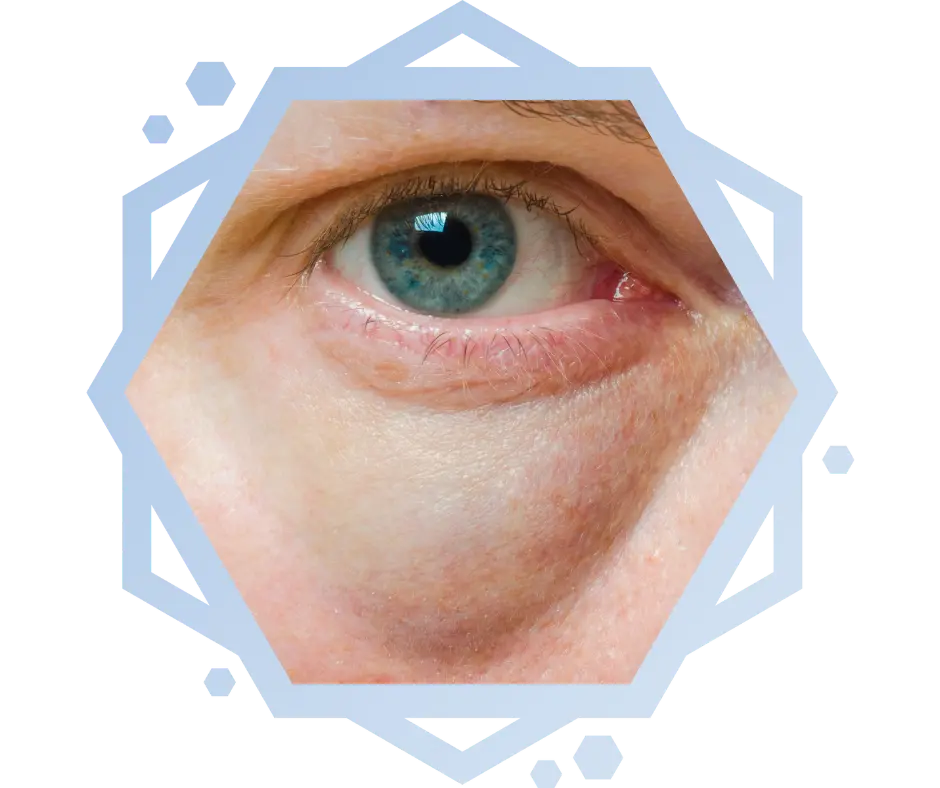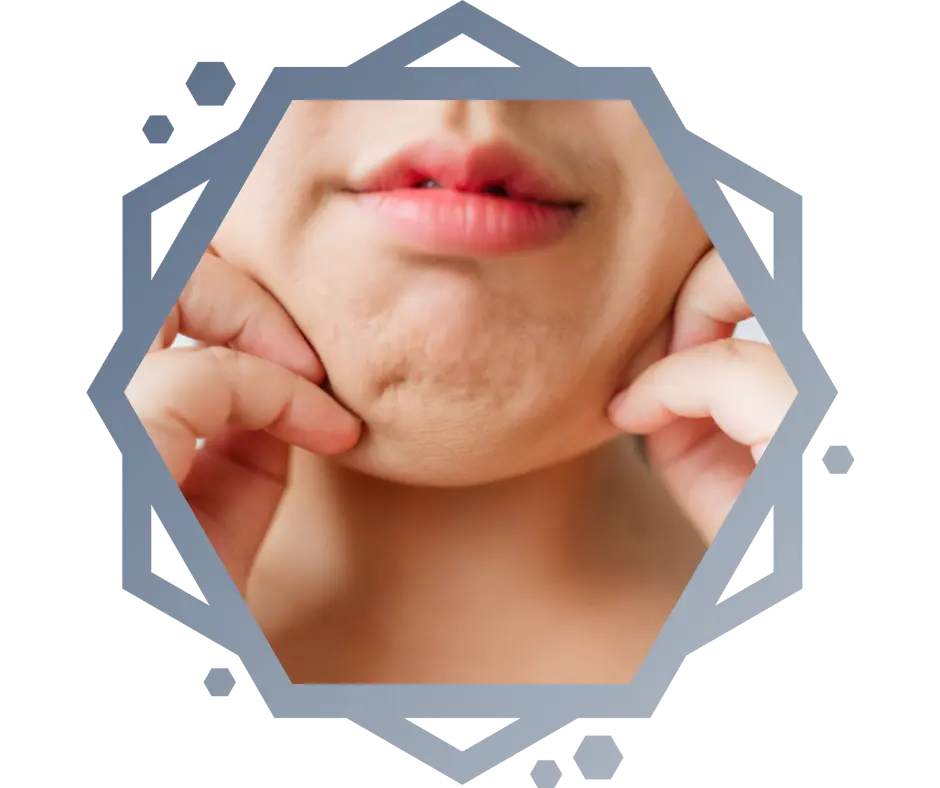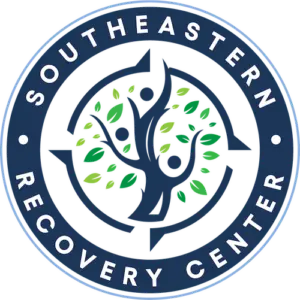Recognizing the signs of alcoholism is the first step in being able to offer help and support to a loved one who is struggling with an alcohol addiction. You can tell a lot about a person by looking at their face – it often exposes truths that they are hiding deep on the inside. That is why one of the physical indications of alcoholism is the impact it has on a person’s face. This guide will help you understand what alcoholism is and how to identify the facial signs associated with it and how to get help for your loved ones.
The physical facial signs of alcoholism, or “alcohol face,” often include:
- Facial redness or broken capillaries
- Puffiness or facial swelling
- Bloodshot eyes
- Jaundice
- Dark circles under the eyes
- Dry, wrinkled skin
- Rosacea and Rhinophyma

What is Alcoholism?
Alcoholism, also known as alcohol use disorder (AUD), is a long-term condition where someone can’t control their drinking even when it causes problems. It can lead to severe health issues, including liver disease, heart problems, and brain damage. Spotting the signs early can help in getting the right kind of help and support.
According to the National Center for Drug Abuse Statistics, 15.8% of North Carolina adults over the age of 18 binge drink at least once per month. Alcoholism is a serious problem within the state, with an average of 4,452 annual deaths that are attributed to excessive alcohol use.
In 2021, over 6,300 deaths in North Carolina were due to excessive alcohol consumption.
7 Characteristics of Alcoholic Face
Alcoholism often leaves telltale signs on a person’s face that can be recognized with a keen eye. These changes are not just superficial; they reflect deeper health issues and the toll that chronic alcohol abuse takes on the body. From persistent redness and puffiness to more severe signs like jaundice and broken capillaries, the face can reveal a lot about a person’s drinking habits. Understanding these facial characteristics can be crucial for identifying and helping those who may be struggling with alcohol dependence.
1. Facial Redness and Broken Capillaries
One of the most noticeable signs of heavy drinking is a face that’s often red, with little red lines caused by broken blood vessels. Alcohol makes the blood vessels in the face expand, leading to a flushed look. Over time, these blood vessels can burst, creating visible red lines or broken capillaries.

2. Puffy or Swollen Face
Alcohol dehydrates the body, causing a range of compensatory reactions. When the body becomes dehydrated, it attempts to retain as much water as possible to maintain balance. This retention is particularly noticeable in the face, where the skin can appear puffy or swollen.
The areas around the eyes and cheeks are most affected due to the delicate nature of the skin and the higher tendency for fluid accumulation in these regions.
3. Bloodshot Eyes
Bloodshot eyes are a common indicator of heavy alcohol consumption. This condition occurs when alcohol causes the tiny blood vessels in the eyes to expand and become more visible, leading to a red and irritated appearance.
Alcohol acts as a vasodilator, meaning it widens blood vessels. When someone consumes alcohol, it causes the small blood vessels in the eyes to expand.
4. Yellowing of the Eyes and Skin (Jaundice)
Jaundice is a condition characterized by the yellowing of the skin and the whites of the eyes, and it is often a sign of severe liver damage. This condition results from high levels of bilirubin in the blood, which is a yellow pigment produced during the normal breakdown of red blood cells. The liver usually processes bilirubin and excretes it as bile.
When the liver is damaged, as can happen with severe alcohol abuse, it can’t efficiently process and eliminate bilirubin, leading to its buildup in the body.
5. Dark Circles Under the Eyes
Dark circles under the eyes are a common sign of chronic alcohol consumption. Constant drinking can disrupt sleep patterns and lead to chronic fatigue, which often manifests as dark circles. While alcohol might help some people fall asleep faster, it disrupts the overall quality of sleep by reducing REM sleep. This disruption results in lighter, less restorative sleep, leading to fatigue and sleep deprivation.
6. Dry and Wrinkled Skin
Chronic alcohol consumption can significantly affect skin health, leading to dryness and premature wrinkles. Alcohol is a diuretic, which means it increases urine production and leads to dehydration. When the body is dehydrated, it affects the skin’s moisture levels, causing it to become dry and less elastic. Dehydrated skin lacks the necessary water content to maintain its plumpness and resilience, leading to a rough texture and an increased tendency to wrinkle.
7. Rosacea and Rhinophyma
Rosacea is a chronic skin condition that primarily affects the face, causing redness, swelling, and visible blood vessels. It can significantly worsen with alcohol consumption, making it an important indicator of heavy drinking. In severe cases, rosacea can progress to rhinophyma, a condition characterized by a bulbous, red, and enlarged nose.
Rhinophyma is more prevalent in men than in women, which may be due to higher rates of severe rosacea and alcohol consumption among men.

Health Complications Associated with Alcoholic Face
The facial signs of alcoholism aren’t just skin-deep; they often point to serious health problems that need medical attention. Chronic alcohol use can take a serious toll on the body – understanding that the face is the window to more serious problems can help you get the right treatment for your loved one.
The following are serious health complications that are associated with alcoholic face:
- Liver Disease: Liver damage, including fatty liver, hepatitis, and cirrhosis, is a common result of chronic alcohol abuse. Facial signs like jaundice are direct indicators of serious liver problems.
- Heart Problems: Alcoholism raises the risk of high blood pressure and heart diseases, which can also contribute to facial redness and broken capillaries.
- Nutritional Deficiencies: Heavy drinking can lead to poor nutrition since alcoholics often ignore a balanced diet. This lack of nutrition can worsen skin problems and overall facial appearance.
- Neurological Damage: Alcohol can cause serious damage to the nervous system, leading to conditions like peripheral neuropathy and cognitive decline. These conditions can show up as changes in facial expressions and movements.
How to Help and Support an Alcoholic Loved One
Seeing a loved one struggle with alcoholism is hard, but it is even harder to see the physical toll it takes on them.
While recognizing physical signs, like alcoholic face, is important, it is just as important to approach the situation with compassion and support when asking them to seek treatment. Here are some steps to consider:
- Express Concern: Approach the person with empathy and express your concern about their drinking habits and physical appearance. Avoid judgment and focus on your desire to help.
- Encourage Medical Evaluation: Suggest a medical check-up to assess the extent of any physical damage and to discuss potential treatment options. A healthcare professional can provide a comprehensive plan to address both the physical and psychological aspects of alcoholism.
- Support Groups: Encourage participation in support groups like Alcoholics Anonymous (AA). These groups provide a community of individuals who share similar experiences and can offer valuable support and guidance.
- Professional Treatment: Consider professional treatment options, including detox programs, rehab centers, and therapy. These resources can provide structured and effective ways to overcome alcohol dependence.
Seeking Help for Alcoholic Face in North Carolina
Spotting the facial signs of alcoholism can be a crucial step in recognizing and addressing this serious condition and the effects it has on the body. Combining this awareness with a compassionate approach and encouraging professional help can make a significant difference in the lives of those affected by alcoholism.
Southeastern Recovery Center knows how hard it can be for someone to seek treatment for alcoholism, which is why we are here to guide you and your loved ones through the process. You don’t have to start a life of sobriety on your own – we can help you overcome addiction and treat your alcoholic face and associated health conditions. Call us today to learn more about our alcohol rehab in North Carolina.





